 | | | 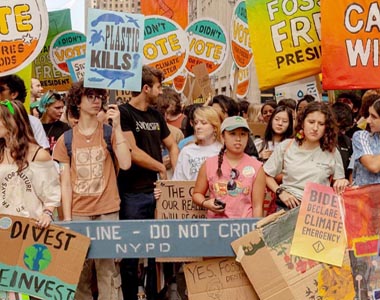 September has been quite an eventful month for the climate world. With the third day of rain hitting my window, I am reminded that climate change is not going to happen… it is happening now. Stronger storms, increased rainfall, and the heat waves of the summer all signal how the climate has changed. As we enter fall, we continue to experience the warning signs of a changing climate. But, this time, we can also see the colors of tens of thousands of climate activists who marched in the streets of New York. In the March to End Fossil Fuels, activists, organizers, and citizens from all over the U.S. came to voice their support to end fossil fuel usage. In fact, Rachel Carson Council Presidential Fellow Joy Reeves and other RCC members were there with Reeves caught on camera in the lead in a New York Times front-page photo. In this September issue of The RCC Campus Dispatch, Reeves reports from the front lines in New York. September has been quite an eventful month for the climate world. With the third day of rain hitting my window, I am reminded that climate change is not going to happen… it is happening now. Stronger storms, increased rainfall, and the heat waves of the summer all signal how the climate has changed. As we enter fall, we continue to experience the warning signs of a changing climate. But, this time, we can also see the colors of tens of thousands of climate activists who marched in the streets of New York. In the March to End Fossil Fuels, activists, organizers, and citizens from all over the U.S. came to voice their support to end fossil fuel usage. In fact, Rachel Carson Council Presidential Fellow Joy Reeves and other RCC members were there with Reeves caught on camera in the lead in a New York Times front-page photo. In this September issue of The RCC Campus Dispatch, Reeves reports from the front lines in New York. Fossil fuels, of course, have been on the mind of climate activists for years, yet it often can feel like action is slow. However, in addition to the march in New York City, with climate champion Alexandria Ocasio-Cortez in attendance, September also brought a major victory for the campus divestment movement. NYU has announced they will divest from fossil fuels. There are wins and losses. Part of keeping that momentum is to continue to strive for the wins when losses present themselves. Wins and losses are especially prevalent at colleges and universities. College campuses are unique places where students are able to voice their opinions and fight for what they believe in. For example, multiple Rachel Carson Council National Environmental Leadership Fellows are advocating for fossil fuel divestment on their campuses. Some of these campuses are not fond of the word “divestment”, and so these students have a long, hefty fight in front of them. For other schools, like Oregon State University, grants to maintain important climate projects have been extended, while at West Virginia University, twenty-eight academic programs have been cut, leading to panic and stress from students, staff and faculty. Universities are one of the places where our future generations are learning about how to care for the earth, so it is essential that we oppose efforts to cut college programs and urge campuses to operate with the same morals and hope we all want to be instilled for the future. Caring about climate change and the future is exactly what RCC President Bob Musil found this month at rival campuses Duke University and North Carolina State (NCSU) that turned out students and faculty to hear him speak and join the RCC. As we report here, NCSU has now become the 66th campus to join the RCC Campus Network (RCCN).  With our 2023-2024 RCC Fellows back on campus, we spotlight their writing and how campuses can better live up to their promises. Among the essays in “RCC Fellows Speak Out,” Suzanna Schofield of Wellesley College and Ellie Crone of Vanderbilt examine what can be done by environmental advocates on campus when their universities have announced fossil fuel divestment, but not followed through. Aaditi Lele, also at Vanderbilt, details why divestment must include liquid natural gas (LNG) and other “transition” fossil fuels that are buried in endowment as “cleaner” alternatives. And Angela Zhong of Harvard finds, in addition to very slow progress, reasons to hope after she attended the COP 27 climate talks in Egypt, as well as thoughts for this year’s COP 28 in Dubai and beyond. With our 2023-2024 RCC Fellows back on campus, we spotlight their writing and how campuses can better live up to their promises. Among the essays in “RCC Fellows Speak Out,” Suzanna Schofield of Wellesley College and Ellie Crone of Vanderbilt examine what can be done by environmental advocates on campus when their universities have announced fossil fuel divestment, but not followed through. Aaditi Lele, also at Vanderbilt, details why divestment must include liquid natural gas (LNG) and other “transition” fossil fuels that are buried in endowment as “cleaner” alternatives. And Angela Zhong of Harvard finds, in addition to very slow progress, reasons to hope after she attended the COP 27 climate talks in Egypt, as well as thoughts for this year’s COP 28 in Dubai and beyond. Action on the climate crisis can seem excruciatingly slow as the wind and rain slant against my window. But taking a longer view can offer hope as we can look back to see progress from where we have been. That is what RCC President Bob Musil finds in his review essay of Christian Cooper’s Better Living Through Birding. Cooper, a Black, gay, birdwatcher reveals how over a lifetime in the closet his experiences with nature and the people who love it have led to his emerging into his full humanity. There are wins and there are losses. This September, in the rain, may you discover some wins, some hope for the future. Mackenzie Bodman, Associate Director, Civic and Campus Engagement. | | | | | | | | 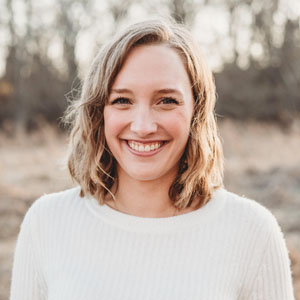 Mackenzie Bodman is the Associate Director of Civic and Campus Engagement for the Rachel Carson Council. An advocate for environmental justice, climate change and policy, Mackenzie works to combine science, justice, and policy to advocate for imaginative solutions to environmental challenges. Mackenzie Bodman is the Associate Director of Civic and Campus Engagement for the Rachel Carson Council. An advocate for environmental justice, climate change and policy, Mackenzie works to combine science, justice, and policy to advocate for imaginative solutions to environmental challenges. | | | | | | RCC President Musil Welcomed at Rival Universities The Duke Blue Devils and the NC State Wolfpack are fierce rivals on the basketball court. But both universities equally welcomed RCC President Bob Musil to campus as Musil spoke about “The Legacy of Rachel Carson and Environmental Justice Today.” Carson began her writing career on the beaches of North Carolina, which she loved and limned in her first book, Under the Sea-Wind (1941, 1952). Musil began his tour at Duke, one of the RCC’s premier members of the Rachel Carson Council Campus Network (RCCN), with over 5,000 active members among faculty, students, staff and administrators. | | | | | | | | Despite National Pushback, West Virginia Will Cut Faculty, Programs A month of intense public and on-campus pressure did not dissuade the Board of Governors from siding with the administration to slash programs and positions. MORGANTOWN, W.Va.—Despite pleas from students, faculty members and academic organizations to change course, and despite student protesters disrupting its Friday meeting, the West Virginia University Board of Governors voted Friday to slash 143 faculty positions and 28 academic programs from its flagship Morgantown campus. | | | | | | | | New York University Will Divest From Fossil Fuels in Win For Student Activists One of largest private universities in US, with endowment of over $5bn, takes steps to address climate crisis after years of student protest New York University plans to divest from fossil fuels, the Guardian has learned, following years of pressure from student activists. The move from one of the US’s largest private universities, whose endowment totals over $5bn, represents a significant win for the climate movement, organizers said. | | | | | | | | New Documentary Sheds Light on CCNY Student Uprising of ‘69 The protests over Civil Rights and the Vietnam War that swept campuses in the 1960s are regarded as a high point in the history of youth activism, with extensive interest in the student demonstrations at institutions like Columbia University and the University of California, Berkeley. Less attention has been paid, however, to the 200 protests spearheaded by Black and other minoritized students over issues that directly affected their schools, which were some of the most impactful. | | | | | | | | Erasing the “Black Spot”: How a Virginia College Expanded by Uprooting a Black Neighborhood Sixty-plus years ago, the white leaders of Newport News, Virginia, seized the core of a thriving Black community to build a college. The school has been gobbling up the remaining houses ever since. Katie Luck was sitting in her yard under a magnolia tree one afternoon in April when a school bus passed by. A white elementary school student shouted at her from a window, “You don’t belong here.” | | | | | | | | Is the Political Climate in Southern States Driving a Faculty Exodus? One-third of faculty in Florida, Texas, Georgia and North Carolina said they would pursue out-of-state jobs in the coming year, AAUP found. Political interference in higher education and changes to tenure are significantly affecting faculty morale and retention in a handful of southern states, new survey findings from the American Association of University Professors suggest. | | | | | | | | For Selective Institutions, Progress and Backsliding on Socioeconomic Diversity New York Times database shows some colleges have gained in socioeconomic diversity, but many have declined. Ten years ago, Washington University in St. Louis was among the least economically diverse selective colleges in the U.S. Only about 6 percent of first-year students were recipients of the Pell Grant, a federal, income-based form of financial aid. | | | | | | | | | | Ohio Republicans to Push Revised Bill Limiting College DEI and Faculty Strikes The author of the far-reaching proposal is optimistic it will pass the House, despite strong pushback from faculty groups and unions. The Ohio Legislature made headlines in May when its Senate passed a bill that would largely ban diversity, equity and inclusion training efforts at public colleges, bar institutions from taking positions on “controversial” topics and limit employee collective bargaining. | | | | | | | | Marine Lab Study Finds Microplastics Embedded in Tissues of Whales and Dolphins Analysis indicates ingested microplastics migrate into whales’ fat and organs BEAUFORT, N.C. – Microscopic plastic particles have been found in the fats and lungs of two-thirds of the marine mammals in a graduate student’s study of ocean microplastics. The presence of polymer particles and fibers in these animals suggests that microplastics can travel out of the digestive tract and lodge in the tissues. | | | | | | | | Climate Change is Destroying Reefs, But the Effects Are More Than Ecological – Coral’s Been Woven Into Culture and Spirituality for Centuries Hurricane Idalia made landfall on Florida’s Gulf Coast on Aug. 30, 2023, bringing surging seas and winds over 100 mph. Meanwhile, another climate emergency has been unfolding along Florida’s coast this summer: a marine heat wave bleaching corals throughout the world’s third-largest barrier reef. | | | | | | | | Petrels ‘little superheroes’ to Researcher Kate Sutherland Researcher and island resident Kate Sutherland’s work studying the chemical isotopes of the feathers from black-capped petrels may lead to better understanding of the foraging habits — if not the varied physical appearance — of this difficult-to-study, endangered Gulf Stream bird species. Sutherland is set to present her findings in October at a joint Waterbird Society and Atlantic Marine Bird Cooperative conference in Florida. | | | | | | | | Keeping Track: $220M for Ocean Observatories Initiative The U.S. National Science Foundation has awarded a coalition of academic and oceanographic research organizations including Oregon State University a five-year, $220 million cooperative agreement to continue operating and maintaining the Ocean Observatories Initiative. Woods Hole Oceanographic Institution leads the consortium, which also includes the University of Washington. | | | | | | | | 3 Questions: How Are Cities Managing Record-setting Temperatures? MIT Professor of Urban and Environmental Planning David Hsu explains what municipal governments are doing as climate change accelerates. July 2023 was the hottest month globally since humans began keeping records. People all over the U.S. experienced punishingly high temperatures this summer. In Phoenix, there were a record-setting 31 consecutive days with a high temperature of 110 degrees Fahrenheit or more. | | | | | | | | Study Connects Greenhouse Gas Emissions to Polar Bear Population Declines, Enabling Greater Protections Under Endangered Species Act New research from the University of Washington and Polar Bears International in Bozeman, Montana, quantifies the relationship between greenhouse gas emissions and the survival of polar bear populations. The paper, published online Aug. 31 in Science, combines past research and new analysis to provide a quantitative link between greenhouse gas emissions and polar bear survival rates. | | | | | | | | Institute Renamed to Reflect Holistic Approach to Energy, Environmental Research The newly named Institute of Energy and the Environment has rebranded to better communicate its current structure and collaborative approach to solving energy and environmental challenges. Celebrating its 60th anniversary in 2023, the newly renamed Institute of Energy and the Environment — formerly the Institutes of Energy and the Environment — continues to advance energy and environmental research at Penn State by connecting and supporting interdisciplinary teams of researchers. | | | | | | | | How Do We Dismantle Offshore Oil Structures Without Making the Public Pay? As pressures build for the energy industry to move away from fossil fuels, two new reports examine the risk that fossil-fuel companies will default on future obligations to decommission offshore oil and gas infrastructure and pass the costs on to the public. The reports lay out recommendations to avoid such a scenario. They were just published by the Sabin Center for Climate Change Law and the Columbia Center on Sustainable Investment (CCSI), as part of their broader Climate Law and Finance Initiative. | | | | | | | | Student Research on Impacts of Pollution and Climate Change Environmental Science students are working this summer to better understand forces harming ecosystems From analyzing microplastics in our waterways to researching methane emissions in trees, American University’s Environmental Science graduate and undergraduate students are hard at work this summer, conducting research that has critical implications for better understanding how pollution and climate change are affecting our planet. | | | | | | | | A Realization of Tomorrow: An RCC Fellow Reflects on the NYC March to End Fossil Fuels On September 17, I joined an estimated 75,000 activists in a climate march through the streets of New York City to end fossil fuels. The morning of the March, I went to the gym at 7am for an arm workout, not realizing that my arms—not my legs—would soon be screaming in protest from four hours of waving a sign at the front of the Youth Hub. I donned my Rachel Carson Council t-shirt, a pair of walking shoes, and an edgy nose ring—not realizing I would end up on the front page of the New York Times. | | | | | | | | Destruction and Resilience: Black Wall Street and Durham’s Struggle for Racial Justice and Food Security Durham, North Carolina, is home to one of the most well-documented examples of a thriving, interconnected Black community in the twentieth-century American South. Named after the endless line of Black-owned businesses on West Parish Street, Durham’s Black Wall Street encapsulated the larger African-American community of Hayti, where residents could shop at Black-owned stores, worship in predominantly Black parishes, and apply for insurance from the nation’s first Black-owned insurance company, North Carolina Mutual Life Insurance Company. | | | | | | | | Rooted in History, Branching into Activism: The Vanderbilt Divestment Movement On November 13, 2022, the Vanderbilt University community was in mourning, not for a person, but for a tree. Vanderbilt’s Bicentennial Oak, estimated to be around 250 years old, fell on the evening of November 12. It was soon determined that the tree collapsed due to “age-related decay.” Saddened community members attended a candlelight vigil days later, laying flowers at the fallen tree and holding a 250-second moment of silence. | | | | | | | | Greenwashers: Stop Trying to Recruit Gen-Z It’s 2023, and in this year alone, Shell has paid influencers to show themselves filling cars with gas, BP has dialed back on their climate pledge while simultaneously marketing net zero progress, and a $1 billion lawsuit was filed against Delta Airlines for misleading consumers with sustainability claims. While there has been a substantial increase in discussions around greenwashing in recent years, it’s important to note that there are other actors beyond corporations who are to blame for making false claims about sustainability. | | | | | | | | What the Frack? How Does Fracking Work and Why is it an Environmental Justice Issue? Hydraulic fracturing, more commonly referred to as hydrofracturing, hydrofracking, or simply fracking, is a well-stimulation process used by fuel companies to increase the oil and/or natural gas flow to wells from petroleum-bearing rock formations. It is done in geologic layers with low permeability such as tight sandstone, shale, and certain coal beds where oil and natural gas are naturally found. | | | | | | | | Liquified Natural Gas (LNG): Clean or Climate Injustice? Across the country, divestment campaigns are fighting for universities, pension funds, and more to take their investments out of fossil fuels. As recently as earlier this month, activists at New York University won a decade-long fight to divest their university’s endowment from fossil fuel investments. But as these campaigns persist, it’s important to keep a close eye on the fossil fuel industry’s efforts to put profit over people. From coal mines to oil extraction and shale drilling, the fossil fuel industry has lived many lives. | | | | | | | | How Can I Reduce My Carbon Footprint? In 2017, when I was a third-year student at college, I had the privilege of taking a course on climate change. This was a discussion course, but I had to read scientific research papers which was not something I enjoyed. Nevertheless, I knew I had to make up my mind to read articles to avoid myself getting confused during the discussion session. One particular week, we were asked to read about carbon footprints and I started liking readings more than ever before since I found that a carbon footprint can be applicable to our daily lives. | | | | | | | | Do Climate Conferences Matter? The United Nations’ Climate Change Conference of the Parties (COP27) in Sharm Al-Sheik, Egypt was one of the most unifying moments in my year for engaging a diverse group of stakeholders, despite some of its flaws. I was fortunate enough to attend the first week of COP27 through the SustainUS delegation and meet youth, elders, activists, policymakers, business leaders, and more from all over the world. More than just listening to their perspective or work, I discussed, learned, and grew in my ways of thinking about what change looks like and what avenues are open to us to enact that progress. | | | | | | | | Divestment at Wellesley College? Since 2021, when Wellesley College agreed to divest from fossil fuels, there has been only silence. When the Board of Trustees agreed to divest, most people thought of the issue as completed. Yet, because of the increase in oil prices around the globe, Wellesley’s exposure to fossil fuel investments has actually increased from $95 million to $115 million in Fiscal Year 2022. Although it says on the Wellesley website that exposure to fossil fuel investments is expected to decline over the next several years as existing investments fully liquidate, data has been hard to find, and clear communication has been lacking. | | | | | | | | Musil Book Review Essay: Open Your Eyes and See Christian Cooper, Better Living Through Birding:
Notes from a Black Man in the Natural World (Random House, 2023) 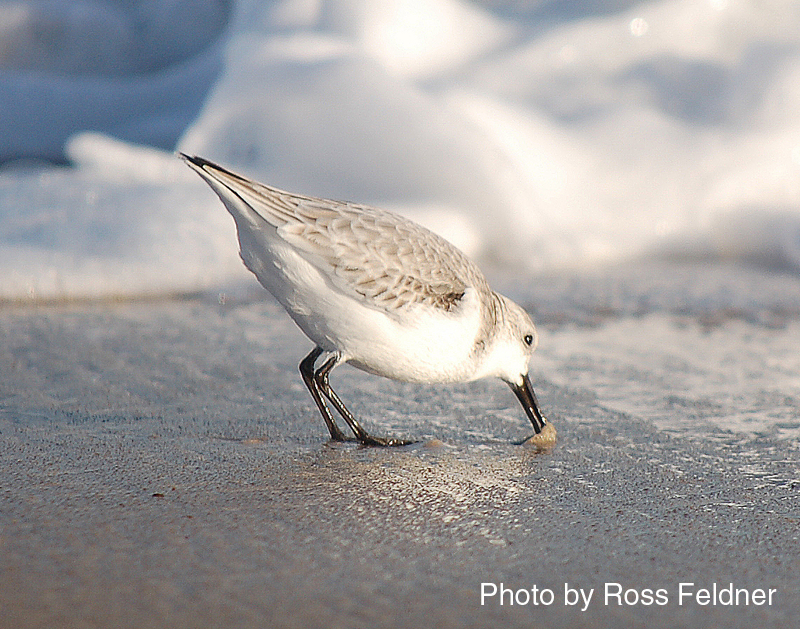 I grew up just a few miles away from the noted birder, Christian Cooper. We must have roamed the same dunes, watched the same sanderlings scurrying through the surf, seen the same shells and sand sharks at Jones Beach. We developed a love of nature and birds from our parents on Long Island (his father, my mother). We love the same birds and even the sound of their names (Blackburnian Warbler). But we might as well have grown up on opposite sides of the planet. I am white, straight, and went to Yale. Cooper went to Harvard and is Black and queer. I grew up just a few miles away from the noted birder, Christian Cooper. We must have roamed the same dunes, watched the same sanderlings scurrying through the surf, seen the same shells and sand sharks at Jones Beach. We developed a love of nature and birds from our parents on Long Island (his father, my mother). We love the same birds and even the sound of their names (Blackburnian Warbler). But we might as well have grown up on opposite sides of the planet. I am white, straight, and went to Yale. Cooper went to Harvard and is Black and queer. 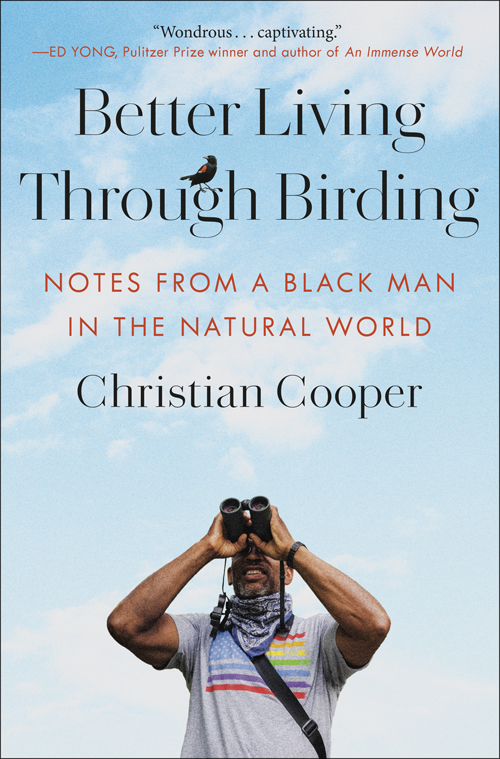 I opened his book expecting to travel along with Cooper on birding forays and, ultimately, to hear his own account of having a White woman in Central Park who refused his request to leash her dog call the police on him. She reported she was being threatened by a Black man with binoculars and a bike helmet. I opened his book expecting to travel along with Cooper on birding forays and, ultimately, to hear his own account of having a White woman in Central Park who refused his request to leash her dog call the police on him. She reported she was being threatened by a Black man with binoculars and a bike helmet.
Better Living Through Birding is indeed filled with wonderful birds and birding. It opens with an exhilarating account of his tracking the extremely rare Kirtland’s Warbler in Central Park. Cooper gets a text at his office that this rarity may be there and he dashes out so rapidly that his co-workers think someone must have died. The excitement in Central Park foreshadows Cooper’s later confrontation with Amy Cooper (no relation) and her dog, Henry, as he rushed to find the last warbler of the season, the ground hugging Mourning Warbler. Its habitat is exactly where Henry was bounding around with Amy shouting after him. But Cooper’s autobiographical odyssey offers far more than warbler observations, ospreys or owls. READ MORE | | | | | | Plan Your 2023 Campus Events with RCC now! RCC prides itself on its National Campus Network of 66 colleges and universities. We are working to engage faculty members, students, and administrators in our efforts for a more just and sustainable world. With our growing fellowship program, our presence on campuses across the country has never been greater. Contact RCC today to bring our staff to your campus for lectures, workshops, or meetings to help find the best ways to engage your faculty and students in the efforts against climate change, environmental justice, and the work of the Rachel Carson Council. Campus Visits with RCC President, Dr. Robert K. Musil 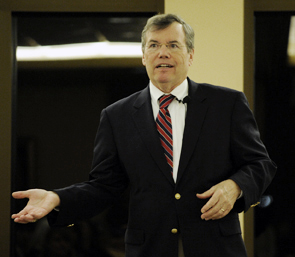 RCC President & CEO, Dr. Robert K. Musil, a national leader in climate change, environmental justice and health is again available to book for in-person campus speaking events! Musil has been called “informative, challenging and inspirational all at once.” He is “motivational” with “intellectual depth” and “extraordinary impact.” RCC President & CEO, Dr. Robert K. Musil, a national leader in climate change, environmental justice and health is again available to book for in-person campus speaking events! Musil has been called “informative, challenging and inspirational all at once.” He is “motivational” with “intellectual depth” and “extraordinary impact.”
Dr. Musil is available for campus lectures and visits involving classes, meetings with campus and community groups, consultations with faculty and administrators, or for Earth Day, Commencement, and other special events. Stays range from one to three days. Reduced fees are in place for 2023-2024 and can be designed to meet reduced budgets. To arrange a campus visit with Dr. Musil, contact the RCC President’s Office at office@rachelcarsoncouncil.org or call 301-214-2400. The RCC also offers talks, classes, and workshops on student engagement, activism, sustainability, and the RCC Fellowship program with, Associate Director of Civic and Campus Engagement, Mackenzie Bodman, Associate Director of Climate Justice, Bella Jaramillo, Associate Director of Communications, Claudia Steiner, Director of Policy and Programs, Maya Cohn. To arrange, contact Associate Director of Civic and Campus Engagement, Mackenzie Bodman. | | | | | | | |  The Rachel Carson Council Depends on Tax-deductible Gifts From Concerned Individuals Like You. Please Help If You can. The Rachel Carson Council Depends on Tax-deductible Gifts From Concerned Individuals Like You. Please Help If You can. | | | |  Sign Up Here to Receive the RCC E-News and Other RCC Newsletters, Information and Alerts. Sign Up Here to Receive the RCC E-News and Other RCC Newsletters, Information and Alerts. | | | | | | | | | | | |